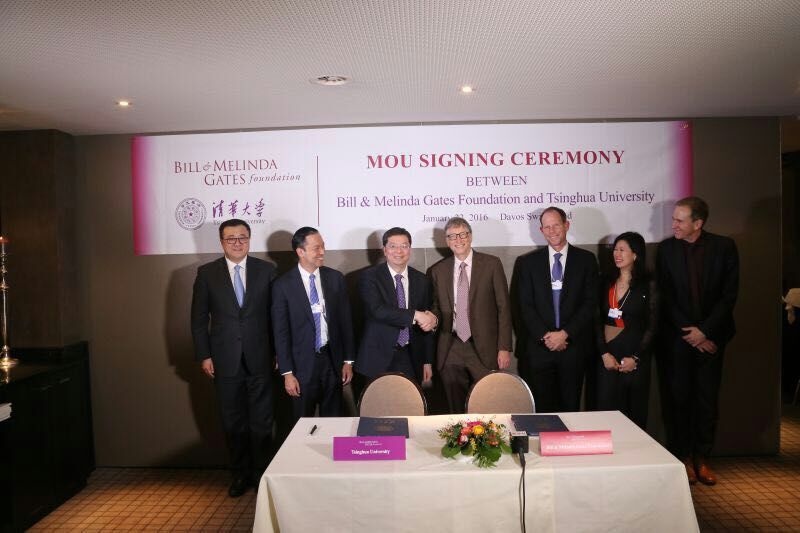Global Health Drug Discovery Institute to be launched in Beijing
chinagate.cn, January 25, 2016 Adjust font size:

Tsinghua University Gates Foundation join forces to establish the Global Health Drug Discovery Institute in Beijing
At a meeting in Davos, Switzerland on January 22nd, Qiu Yong, President of Tsinghua University, and Bill Gates, Co-chair of the Bill & Melinda Gates Foundation (BMGF), agreed to co-found the Global Health Drug Discovery Institute (GHDDI) in Beijing, China, and signed a memorandum of understanding. The Institute will be the first research and development center of its kind in China.
GHDDI in Beijing aims to create a transformative drug discovery and translational medicine institute for global health with advanced biomedical research and development capabilities. The institute will tackle major diseases faced by many developing countries, including China. It will leverage China’s significant talents and R&D capacities, promote international collaborations, and enhance early drug development by bridging global drug discovery innovations with translational developments.
President Qiu stated that Tsinghua University had been building biomedical research since the 1980s, and had since made substantial developments. Building on these progresses, Tsinghua University established the School of Pharmaceutical Sciences on December 25th in 2015, and has designated pharmaceutical sciences as a new key development area in its thirteenth five-year plan. The establishment of GHDDI is an important effort by Tsinghua University to advance pharmaceutical research and translational medicine. President Qiu emphasized that, in parallel with the development of the pharmaceutical sciences, Tsinghua University will leverage its strengths in related disciplines such as chemistry and chemical engineering, material science, medical engineering, and information technology to enhance its overall capabilities in biomedical research. He also hoped this initiative will facilitate the reform of pharmaceutical R&D system in China and impact global health.
“China has made incredible progress in reducing poverty and shares the foundation’s commitment to harnessing advances in science and technology to address the critical health challenges affecting the world’s poorest people,” Bill Gates said. “We are excited about GHDDI’s potential to drive innovation in global health research and development, and look forward to partnering with Tsinghua University on our continued work to address the world’s most pressing global health challenges.”
As co-founding partners of GHDDI (Beijing), BMGF will provide financial support as well as assistance on institutional development, whereas Tsinghua University will invest various resources to support the Institute, including talents/scientists, programs, facilities, as well as operation and management. GHDDI (Beijing) is expected to build an open and collaborative environment, to attract and work with many more outstanding partners from China and around the globe.
GHDDI (Beijing) will enter into a strategic alliance with the California Institute for Biomedical Research (Calibr), which has an outstanding track record in early drug discovery and development. This partnership will help the Institute strengthen its expertise and capacity in translational medicine.
BMGF is dedicated to driving innovation in global health and development. It endeavors to solve health problems that plague the poorest populations in the world, including diseases such as tuberculosis, malaria and HIV/AIDS. It has rich experience in cooperating with world-leading biomedical research institutes, international organizations and drug manufacturers, and has already become a key player in catalysing an effective global health research eco-system. The establishment of GHDDI in Beijing is yet another important collaboration between the Gates Foundation and China.
To meet the ever-increasing need for highly-qualified pharmaceutical talent, Tsinghua University had created both undergraduate and Ph.D. programs in pharmaceutical studies by integrating resources in education and research from related disciplines, including chemistry, biology, medicine, and engineering. The Department of Pharmacology and Pharmaceutical Science was established under the School of Medicine in 2012. On December 25th, 2015, the School of Pharmaceutical Sciences was founded. The School will conduct research at the forefront of pharmaceutical sciences, in areas such as small molecule drugs, biologics, gene therapy, cell therapy, and medical diagnostics and device. By advancing cutting-edge technology, promoting innovative research, and developing new therapies, the School is dedicated to improving health and life quality for all. Professor Ding Sheng, an internationally renowned chemical biologist and leading scientist in translational medicine, is the founding Dean of the School of Pharmaceutical Sciences at Tsinghua University.
According to Professor Ding, the School will collaborate with its partners to assist GHDDI (Beijing) in its future development. As the Institute’s mission aligns with the development strategy of the School of Pharmaceutical Sciences, there will be win-win cooperation in a number of respects, including technology development and translational research innovations, thus fulfilling the common vision of enhancing drug discovery and development to improve global health.